The World Cup and protests collide in Iran
Protests abound inside Iran as the national team plays at the World Cup.
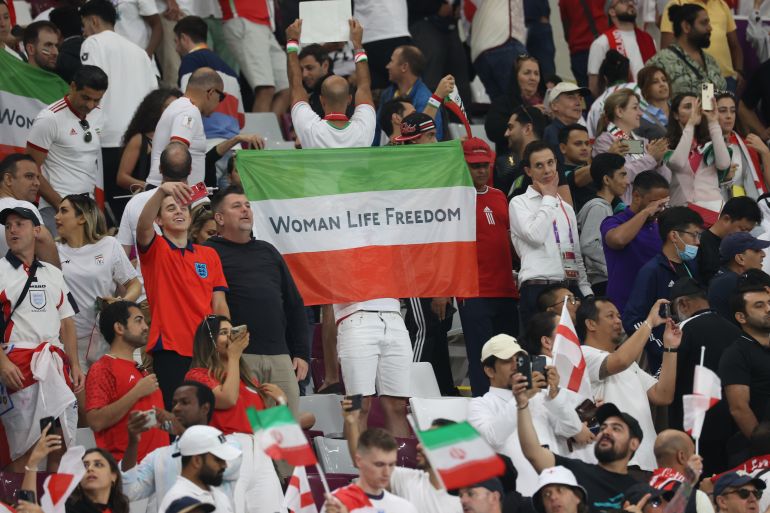
The last time Iran faced the United States at the World Cup, back in 1998, the streets of Tehran erupted in celebration after Iran won. This time around, feelings are much more complicated. Iranians are entering a third month of protests after 22-year-old Mahsa Jina Amini died in police custody in September. Since then, foreign-based rights groups say hundreds have been killed by security forces and thousands arrested. In this episode, we look at the role athletes are playing in Iran’s protests.
Keep reading
list of 4 itemsWhen the Russia-Ukraine war spills over to its neighbours
African coaches take centre stage at World Cup 2022
Inside the Wagner Group, Russia’s mercenary force
In this episode:
- Reza H. Akbari (@rezahakbari), PhD candidate and program manager at Institute for War and Peace Reporting
Connect with us:
@AJEPodcasts on Twitter, Instagram, and Facebook
Full episode transcript:
This transcript was created using AI. It’s been reviewed by humans, but it might contain errors. Please let us know if you have any corrections or questions, our email is TheTake@aljazeera.net.
[SOUND OF CELEBRATION]
Halla Mohieddeen: This is what the streets of Tehran sounded like back in the summer of 1998, after Iran beat the United States in a World Cup match many Iranians remember to this day.
Halla Mohieddeen: The two countries are about to face off again, but this time, the environment in Iran couldn’t be more different.
[SOUNDS FROM IRAN PROTESTS]
Newsreel: Let’s turn to Iran now, where anti-government protests continue across the country.
Newsreel: Their anger was sparked by the death of this woman, Mahsa Amini. She was just 22.
Newsreel: Security forces are cracking down on protests now in their third month.
Halla Mohieddeen: Today, a look at how sport and protest have collided in Iran. I’m Halla Mohieddeen and this is The Take.
[THEME MUSIC PLAYING]
Halla Mohieddeen: I’m talking to someone who’s following both Iran’s sports and its ongoing protest movement very closely.
Reza Akbari: My name is Reza Akbari. I am an Iranian American. I was born and raised in Iran and when I was 16, I moved to the United States.
Halla Mohieddeen: Reza’s a PhD student in Washington, DC, where he also works for the Institute for War and Peace Reporting.
Reza Akbari: I spend most of my time observing Iran and learning about the social political dynamics in the country.
Halla Mohieddeen: And you’re a football fan as well?
Reza Akbari: Yes, yes. I’m a huge football fan and I’ve been since I was a teenager. I think one of my first memories was actually the 1998 World Cup. I was around 14, and just old enough for my mom to let me actually go out in the streets and take in some of the celebrations that happened after Iran beat the United States.
Halla Mohieddeen: Fast forward, you know, goodness knows how many years. Iran has qualified for the World Cup again, and the country does seem to be at quite a pivotal moment, albeit a very different one.
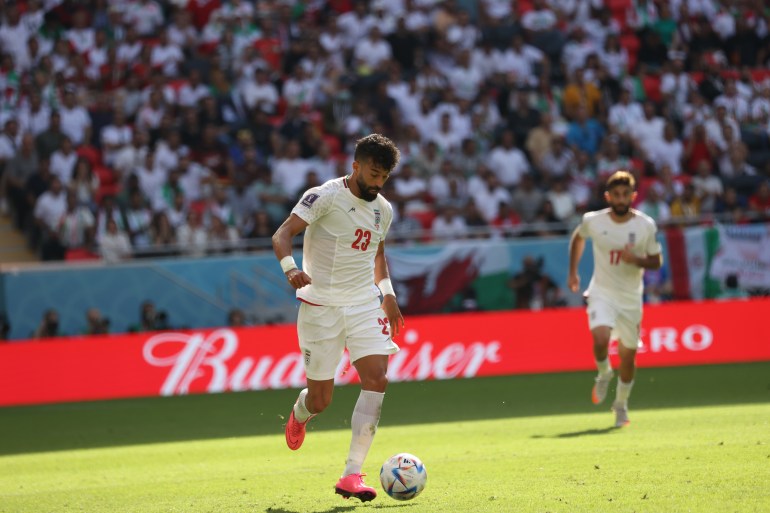
[MUSIC PLAYING]
Halla Mohieddeen: Iran has had sustained protests since mid-September Mahsa Jina Amini, a 22-year-old Kurdish Iranian woman died in police custody. Have you seen images like this out of Iran in your lifetime?
Reza Akbari: Protests are not necessarily unprecedented in Iran. It has a long history of public discontent and revolutions. This time around, I think what is somewhat surprising is the level of resilience of the protestors. We are into the third month and despite suppression and protestors being targeted, attacked, and killed by a lot of security forces, they continue to show up in the street.
Halla Mohieddeen: Well, against the backdrop of these protests, there has been a lot of controversy around whether a team representing Iran should be at the World Cup or not. Can you break down what the arguments on either side look like?
Reza Akbari: Yes certainly. Many individuals in Iran are wondering if this team is supporting the people, supporting the protestors, or is it supporting the regime? Many outspoken critics believe that the players have not really used their platform to express their support for what’s happening on the streets. The flip side of this argument is that the team should be treated as something much bigger than whatever the ruling apparatus in the country is, or whoever they may be.
Halla Mohieddeen: Take for example the 1978 World Cup, just months before a revolution would oust the reigning monarch, Reza Pahlavi. It was Iran’s first time making the tournament. And Iranians still celebrate that team, despite the contentious political situation.
Halla Mohieddeen: But there’s one moment that a lot of the team’s critics have pointed to. Before they flew off to Qatar, the players went to meet with Iranian President Ebrahim Raisi.
Reza Akbari: That caused a lot of anger, among individuals arguing that the regime is killing the protesters. They’re using excessive violence. And in the middle of this, you meet with the president of the country and, as the Iranian tradition goes, you actually stand up and slightly bow forward when your name is called, which many interpreted as, as kowtowing essentially to an authoritarian leader.
[MUSIC PLAYING]
Halla Mohieddeen: Reza says a lot of these critics still understand the pressure the team was under.
Reza Akbari: When you get an official invitation from the office of the president, it’s very difficult for you not to show up.
Halla Mohieddeen: Can’t really say no.
Reza Akbari: Yes. But at the same time, I think they believe that that venue should have at least been used as a way to express discontent. Do you really need to stand up and bow?
Halla Mohieddeen: But some players have been more explicit. That includes Sardar Azmoun, Iran’s famous striker, who posted his support on Instagram just days after protests began.
Reza Akbari: What he said was that the ultimate punishment for him could be to be kicked out of the national team, but that’s a small price to pay for even a single strand of Iranian women’s hair.
Halla Mohieddeen: Other players have used social media to share their discontent too, changing their profile pictures to black squares, or commemorating protesters who have been killed.
Reza Akbari: I think one of the most striking examples of actually using the World Cup was Ehsan Hajsafi.
Halla Mohieddeen: Hajsafi is the captain of Iran’s team. And he made a comment during a press conference on the eve of their match with England.
Reza Akbari: He started his statement with…
Ehsan Hajsafi: Be nom-e khoda-ye rangeen kaman.
Reza Akbari: In the name of the God of the rainbow.
Halla Mohieddeen: He was referencing Kian Pirfalak, a nine-year-old boy killed in the Iranian city of Izeh earlier this month. Almost immediately after his death, a video he recorded for a science fair went viral on Persian language social media.
[VIDEO PLAYING]
Reza Akbari: He was demonstrating a science project and he had built a boat out of popsicle sticks or something like that. And he was trying to test out the boat in a tub of water and before he started he said in the name of the God of the Rainbow.
[VIDEO PLAYING]
Reza Akbari: He has become a symbol for a lot of innocent protestors that are being killed.
Halla Mohieddeen: Later in the press conference, Hajsafi directly addressed the protests back home.
Ehsan Hajsafi (translated): We have to accept that the situation in our country is not good and that our people are not happy, they are discontent. We are here but it does not mean we should not be their voice or that we should not respect them.
Halla Mohieddeen: We’re talking on Monday, November 21, and Iran has just wrapped up its match against England. And yes, there were a few goals, we could talk about the sport, but one of the moments that really made an impression, for me at least, happened before a ball was kicked. And that was how the Iranian players reacted when their national anthem was played. Can you just describe what happened?
Reza Akbari: Every single Iranian player simply refused to sing along with the national anthem, in order to show their support with the protestors and their dissatisfaction with what the regime has done thus far.
Halla Mohieddeen: What was your reaction when you saw that? Because my reaction was that’s an enormously brave thing to do.
Reza Akbari: I certainly read it the same way. And to be honest, I teared up a little bit because I also was putting myself in the player’s shoes.
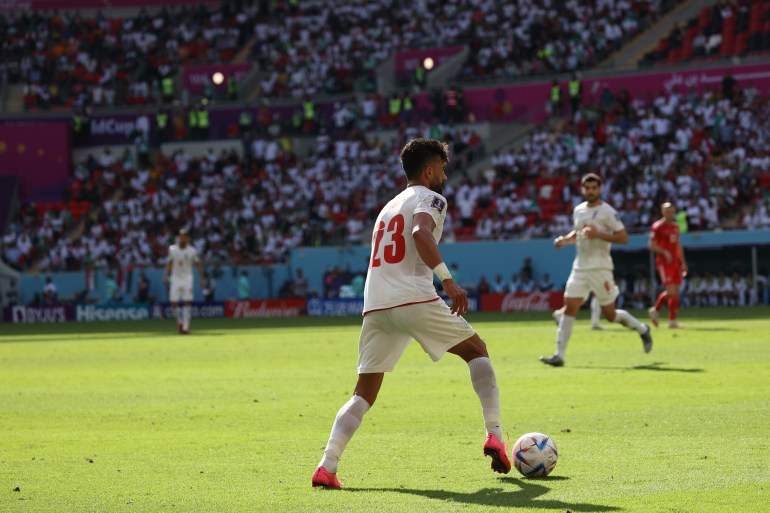
[MUSIC PLAYING]
Reza Akbari: They are under tremendous amount of pressure. Politics aside, I think for any team, any player, just to be able to get to that stage, and on top of all of that, you’re being put under pressure to show some kind of a political gesture, I think shows a tremendous amount of bravery to do something that I think would be very difficult for a lot of us.
Halla Mohieddeen: Do you think they face any kind of repercussions when they eventually return to Iran?
Reza Akbari: I think it’s very possible. There are conservative individuals in the country, parliamentary members, conservative pundits who have already expressed how disgraceful it is for you not to sing along to the national anthem. But the reality of the matter is that we just certainly have to wait and see.
Halla Mohieddeen: How has that been received by Iranians, seeing their team staying silent during the national anthem?
Reza Akbari: There’s a certain segment of the population that will never be satisfied. I think you essentially are done with the regime. You’re done with the team. It doesn’t matter what they do, no gesture is going to be able to make up for the atrocities that have taken place during the past couple of months. The segment of the population that was viewing the team as a national team, rather than a team that belongs to the government, is very content. It was powerful, and the players used the stage that they were given very properly. You also have a segment of the population that was more or less on the fence. They love the game, they love the team, and, some of those individuals, have taken the gesture in a positive manner and of course, they’re hoping for more.
Halla Mohieddeen: Reza told me this on Monday. By Friday, when Iran went up against Wales, things already looked different. This time, the team mouthed along to the anthem, amid jeers and booing from the stands. The day before, the government arrested popular Iranian Kurdish football player Voria Ghafouri, who had played internationally for Iran in the past. Ghafouri has been a vocal supporter of the protests. He’s accused of having tarnished the reputation of the national team and spreading propaganda against Iran.
Halla Mohieddeen: It is quite subtle, these forms of protest and just to move on from football, cause it’s not just the footballers, can you just talk us through some of the other instances of protest from other athletes in other sports?
Reza Akbari: Elnaz Rekabi is probably one of the most prominent examples of this.
Halla Mohieddeen: She’s an Iranian rock climber. And in October, she competed in an Asian championship, noticeably without a headscarf.
Newsreel: There are growing concerns about Iranian climber Elnaz Rekabi who competed without a hijab at a competition in South Korea in defiance of Iran’s strict rules.
Reza Akbari: She, of course, later on said that, oh, given the intensity of the moment I actually forgot and went on without my scarf. But I think as far as the population is concerned, the majority of people believe that this was a sign of protest.
[AIRPORT CELEBRATIONS]
Halla Mohieddeen: Iranians showed up at the airport at the crack of dawn as Rekabi returned from her competition to give her a hero’s welcome. And since her protest, other women athletes have competed abroad without wearing a headscarf.
Reza Akbari: And when it comes to not singing the national anthem, Iran’s national soccer team was not the first team to do so.
[IRAN NATIONAL ANTHEM PLAYING]
Halla Mohieddeen: Iran’s basketball team, volleyball team, water polo team, and beach football team did the same.
Reza Akbari: They all refused to sing the national anthem when the song was being played.
Halla Mohieddeen: There’s another moment that’s received a lot of attention, this one from Saeed Piramoon, a beach football player.
Reza Akbari: He scored a very impressive goal.
[PIRAMOON GOAL AND CHEERING]
Reza Akbari: And, instead of celebrating, what he did is pretended to essentially put his hair in a bun and use his fingers as scissors to cut that. And that’s in solidarity symbolising what countless women have done in Iran as a sign of protest.
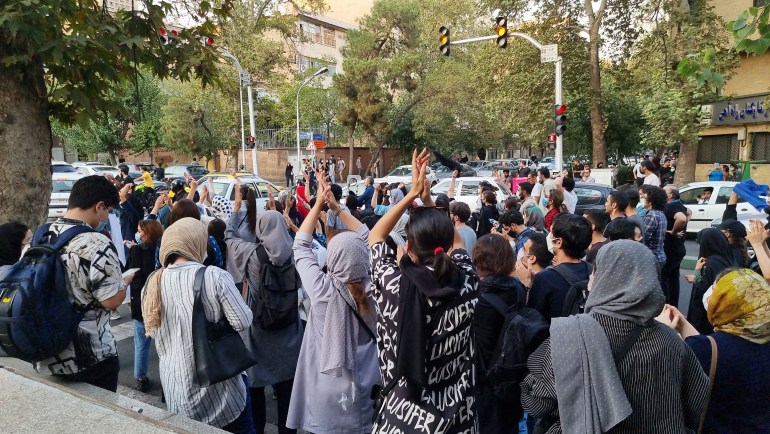
[MUSIC PLAYING]
Halla Mohieddeen: When they do these gestures, where do you think they’re aimed? Are these gestures directed towards the people in Iran or just to show this on a wider international stage?
Reza Akbari: Well I think it depends on the stage. When you’re dealing with the World Cup, your audience by audience by nature is global. But when you are playing for a small futsal club inside the country, that gesture, primarily, I believe, is meant for the local audience and the local protestors.
Halla Mohieddeen: Take, for example, when the local Tehran football club Esteghlal won the country’s super cup earlier this month. The players didn’t celebrate.
Reza Akbari: It was actually an eerie scene to watch. You have a soccer club who has won the championship. The cup is being held up, but all players are standing like statues and are not moving, and no one is cheering. They’re essentially showing their discontent to the security forces and the brutal suppressive policies that the government has implemented thus far.
Halla Mohieddeen: After the break, a look back at 1998, and the most political match in World Cup history.
Halla Mohieddeen: We mentioned this earlier, Reza, but you were in Iran the last time that they played the US in the World Cup, and that was back in 1998. Can you just tell me about the match? What exactly do you remember?
Reza Akbari: Oh my god. That was certainly a different time. You had a country that was experiencing the reform movement. There was a lot of joy already embedded within the society. One of the most controversial matches actually of that period was the game between Iran and the United States, and the Iranian team actually managed to win that game 2-1. Estili’s header is something that many soccer fans will remember. I remember that as well. I was sitting in the living room with my parents and my very young brother at the time, and the entire neighbourhood exploded.
Halla Mohieddeen: And like Reza mentioned earlier, there were massive street celebrations after the match.
[1998 CELEBRATIONS IN THE STREET]
Reza Akbari: I vividly remember a gentleman celebrating on the back of a truck. He fell off and essentially the crowd surfed. He never hit the ground and the crowd surfed back up to the truck and his joy never disappeared. He was jubilant throughout the entire ordeal. Those scenes were certainly rare back then where you would see public dancing and people essentially using their car radios or using boom boxes to blast music, and girls and boys dancing together and the crowds cheering. I think it’s closest to pure joy that I’ve experienced in a long time. So it’s certainly a memorable time.
[MUSIC PLAYING]
Halla Mohieddeen: You did mention, Reza, that the reform movement was in full swing at that time. Can you just remind us what the political circumstances were like back then within Iran?
Reza Akbari: In 1997, you had Mohammed Khatami, who unexpectedly won the presidency of the country. He was a reform-minded cleric and his contender Nategh-Nouri was being backed by the supreme leader, the loss for him was devastating and the victory for Khatami incredible and joyous. The population unequivocally demonstrated that they want change.
Halla Mohieddeen: News reports from the time echo Reza’s nostalgia.
Newsreel: I feel so good. Are you happy he won the election? Very much. Very much.
Reza Akbari: Civil society was bustling and many individuals in the country were hopeful for what Iran could be in the future. Amid all of that, you also have the Iranian team qualify for the World Cup.
Halla Mohieddeen: It was the first time Iran had qualified in 20 years. And the team was beloved by the country.
Reza Akbari: To this day, they’re being referred to as the golden generation of the Iranian soccer. So to kind of have those players, in that moment in history, after decades of not qualifying for the World Cup, it seemed like everything was possible. And the joy of that moment is something I think that many remember and cherish.
Halla Mohieddeen: How have the members of that golden generation of Iranian football reacted to these protests?
Reza Akbari: They have been very vocal.
Halla Mohieddeen: That includes one of the legends of the sport.
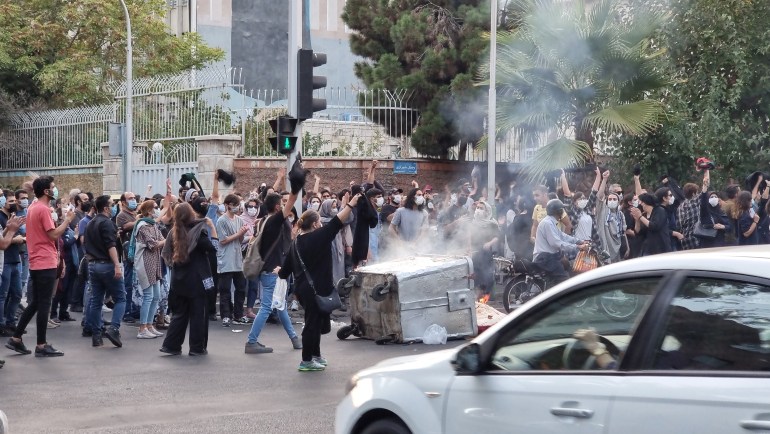
[MUSIC PLAYING]
Reza Akbari: Ali Daei is one of the most prominent football players in Iran. Actually until very recently, he was the record holder for the most international goals scored in the world. Cristiano Ronaldo actually broke his record. Many Iranians believe that Daei is one of the best that the country has ever offered, not just in the field, but his performance off the field as well. He’s very educated and consistent in his approach when it comes to supporting the public.
Halla Mohieddeen: Daei has spoken out many times about the protests, most notably after the death of a schoolgirl in his hometown of Ardabil. Ahead of the World Cup, he made another gesture. On Instagram, he announced that despite an official invitation, he would not be attending the tournament in solidarity with protesters. There’s another player, just shy of that generation, who’s become a populist hero. Ali Karimi got his start for the international team in 1998, months after Iran’s win against the US.
Reza Akbari: His nickname is the magician because of the fact that he was just so talented on the field and his movements were so incredibly hard to predict.
Halla Mohieddeen: Karimi has been vocally in support of demonstrators. Just before Iran played England, he was tweeting, letting people know about a shortage of blood in Javanrud, where rights groups say there was a crackdown against protesters. People in Doha celebrated Karimi, chanting his name both outside the stadium and inside, during the match.
Reza Akbari: The chants are essentially trying to commemorate what he has done. They could also be perceived perhaps as a way to show other players to see his example and duplicate what he has done.
Halla Mohieddeen: If 1998 felt like a moment of opportunity, how do you think Iranians will look back at this tournament? What do you think they’ll remember?
Reza Akbari: I’m not sure if that many pleasant memories will stick with us.
[MUSIC PLAYING]
Reza Akbari: We are dealing with a moment in time where even the fact that the national team may not belong to the people is a question. Also given the tragedies that are happening on the streets in Iran, it’s very difficult to put that in the background and cheer. The context that these games are currently happening in for the Iranians, I think will leave us with memories of frustration and anger from this period, which is a very contrasting kind of feeling when you talk about the 1998 versus what’s happening in Iran today.
Halla Mohieddeen: And that’s The Take. This episode was produced by Negin Owliaei with Chloe K. Li, Ruby Zaman, Amy Walters, Alexandra Locke, Ashish Malhotra, and me, Halla Mohieddeen. Our sound designer is Alex Roldan. The Take’s engagement producers are Aya Elmileik and Adam Abou-Gad. Ney Alvarez is Al Jazeera’s head of audio. We’ll be back on Wednesday.
Episode credits:
This episode was produced by Negin Owliaei with Chloe K. Li and our host, Halla Mohieddeen. Our production team includes Chloe K. Li, Alexandra Locke, Ashish Malhotra, Negin Owliaei, Amy Walters, and Ruby Zaman. Our sound designer is Alex Roldan. Our engagement producers are Aya Elmileik and Adam Abou-Gad. Ney Alvarez is Al Jazeera’s head of audio.